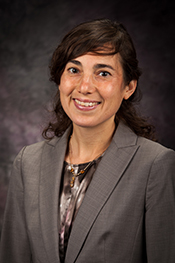Trisha Moore | Associate Professor

Peggy and Gary Edwards Cornerstone Teaching Scholar
Ph.D. - 2011, North Carolina State University
Biological and Agricultural Engineering
M.S. - 2008, Kansas State University
Biological and Agricultural Engineering
B.S. - 2006, Kansas State University
Biological and Agricultural Engineering
Contact information
0039 Seaton Hall
785-532-2911
tlcmoore@k-state.edu
Professional experience
After completing bachelor's and master's degrees at K-State, Moore obtained a doctorate in Biological and Agricultural Engineering at North Carolina State University in 2011. She then completed a post-doc at the University of Minnesota St. Anthony Falls Laboratory in Minneapolis, MN before returning to Manhattan to join the K-State Biological and Agricultural Engineering department in November 2013.
Research
Moore's research is focused on understanding the processes by which natural-based engineered systems contribute to the production of ecosystem services (defined as the benefits people obtain from ecosystems). Water quality and quantity regulation are her primary services of interest, but she has also examined complementary ecological services provided by these systems, including climate regulation through carbon sequestration, biodiversity maintenance, stream baseflow regulation, and increased resiliency to extreme climate events. Moore is interested in the function of these systems at a variety of scales, including site-scale mechanisms through which services are produced in-situ and the watershed-scale at which hydrologic and other benefits from these systems are intended to accrue. Her research group applies models and empirical data to explore questions regarding potential tradeoffs and synergies in the spatial and temporal delivery of ecosystem services under various watershed management approaches. While the context for the majority of Moore's research has been in urban and urbanizing watersheds, her team also works in rural watersheds to understand streambank erosion and how both in-stream and watershed mitigation approaches contribute to regulation of stream erosion. Moore had the opportunity to meld her research with stormwater programming by working with the City of Wichita, KS, to develop an integrated water quality program between the City and upstream agricultural producers in the Little Arkansas River Watershed, which is currently in its first year of implementation.
Academic highlights
Moore has published her work in journals such as Ecological Engineering, Water Environment Research, Climatic Change, and Water Research. She and her graduate students have presented our research in more than 30 posters and oral presentations at both local and national conferences, such as the Kansas Governor’s Water Conference, the Great Plains Low Impact Development Research and Innovation Symposium, and the American Ecological Engineering Society (AEES) and American Society of Agricultural and Biological Engineering (ASABE) meetings. She currently serves as the Secretary of AEES and of the Geomorphology, Streambank Stability and In-stream Processes sub-committee of ASABE. For efforts such as these, Moore was recognized as the Young Member of the Year by the Kansas Chapter of ASABE in 2016.